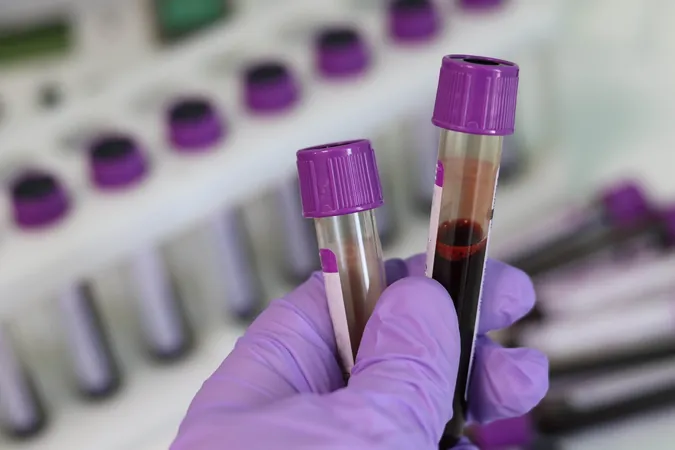
Revolutionary Blood Test Detects HPV-Linked Head and Neck Cancers Years Before Symptoms
2025-09-10
Author: Rajesh
A Game-Changer in Cancer Detection
Human papillomavirus (HPV) is behind about 70% of head and neck cancers in the U.S., marking it as the most prevalent cancer linked to the virus. With rates continually climbing, the urgency for effective early detection methods has never been higher.
The Hidden Threat of HPV Cancers
Unlike cervical cancers, there’s no standard screening for HPV-related head and neck cancers. This leaves many patients diagnosed only after the cancer has ballooned into a sizeable tumor, often causing distressing symptoms and metastasizing to nearby lymph nodes. However, the introduction of new screening methods could revolutionize patient outcomes by allowing for earlier interventions.
Introducing HPV-DeepSeek
Recent research published in the *Journal of the National Cancer Institute* unveils an innovative liquid biopsy tool called HPV-DeepSeek, developed by researchers at Mass General Brigham. This groundbreaking test can identify HPV-associated head and neck cancers up to a staggering 10 years before symptoms manifest, potentially transforming the treatment landscape for patients.
Early Detection Equals Better Outcomes
Lead study author, Dr. Daniel L. Faden, asserts, "This is the first time we’ve demonstrated the capability to accurately detect HPV-associated cancers in asymptomatic patients many years before diagnosis.” By harnessing HPV-DeepSeek, the hope is to catch these cancers at their most nascent stages, enhancing treatment success and lessening side effects.
How HPV-DeepSeek Works
HPV-DeepSeek operates through advanced whole-genome sequencing. It detects minuscule fragments of HPV DNA that have sloughed off from tumors and entered a patient’s bloodstream. Previous studies highlight its impressive capability, achieving 99% specificity and sensitivity during initial clinical presentations.
Promising Results from Initial Trials
In trials involving samples from the Mass General Brigham Biobank, HPV-DeepSeek successfully detected HPV tumor DNA in 22 out of 28 blood samples from patients who would go on to develop cancer years later. In stark contrast, all control samples yielded negative results, underscoring the test's precision. Notably, one critical finding came from a blood sample taken nearly 8 years before a cancer diagnosis.
Refining the Future of Cancer Screening
Researchers utilized machine learning to further enhance the power of HPV-DeepSeek, accurately identifying 27 out of 28 cancer cases even when samples were up to a decade old. The team's next step? Validating these groundbreaking findings in a second study utilizing hundreds of additional samples from the Prostate, Lung, Colorectal, and Ovarian Cancer Screening Trial.
A New Hope for Patients
If successful, HPV-DeepSeek may herald a new era in HPV-linked cancer care, allowing for earlier diagnoses, tailored treatments, and ultimately improving the quality of life for patients. The unfolding journey of this innovative test highlights the crucial role of cutting-edge technology in the battle against cancer.





 Brasil (PT)
Brasil (PT)
 Canada (EN)
Canada (EN)
 Chile (ES)
Chile (ES)
 Česko (CS)
Česko (CS)
 대한민국 (KO)
대한민국 (KO)
 España (ES)
España (ES)
 France (FR)
France (FR)
 Hong Kong (EN)
Hong Kong (EN)
 Italia (IT)
Italia (IT)
 日本 (JA)
日本 (JA)
 Magyarország (HU)
Magyarország (HU)
 Norge (NO)
Norge (NO)
 Polska (PL)
Polska (PL)
 Schweiz (DE)
Schweiz (DE)
 Singapore (EN)
Singapore (EN)
 Sverige (SV)
Sverige (SV)
 Suomi (FI)
Suomi (FI)
 Türkiye (TR)
Türkiye (TR)
 الإمارات العربية المتحدة (AR)
الإمارات العربية المتحدة (AR)